By Archbishop Thomas Wenski - The Archdiocese of Miami
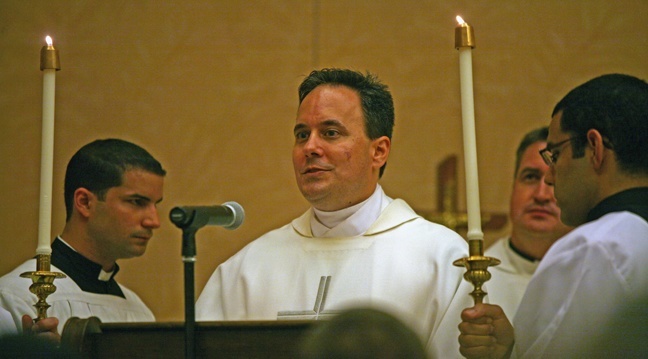
Photographer: MARLENE QUARONI | FC
Father David Zirilli, director of the Propagation of the Faith for the Miami archdiocese, proclaims the Gospel.
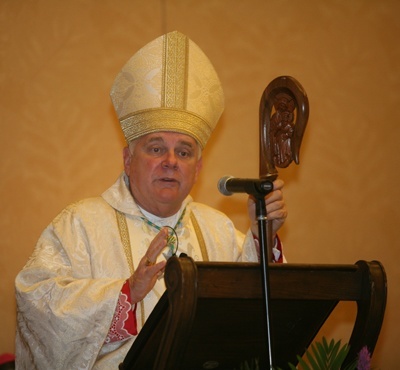
Photographer: MARLENE QUARONI | FC
Archbishop Thomas Wenski preaches the homily at the Mass with Propagation of the Faith directors.
�Thus Joseph, also named by the Apostles Barnabas (which is translated a son of encouragement), a Levite, a Cypriot by birth, sold a piece of property that he owned, then brought the money and put it at the feet of the Apostles.�
In your work, you encourage modern-day Barnabases to be generous with the contributions of time, talent and treasure for the support of the Missions. And their generosity is so important to this work. We thank God for that generosity � for this generosity is inspired not so much by what we do �to cultivate� those gifts but rather by the great favor shown to them by God: grace has inspired graciousness.
Such grace is evidenced not only by the generosity of these donors who give so much to the missions but also it is manifested by the generosity of pastoral care workers in the mission field, especially those who have given their lives. Last year, Fides � the news agency of the Pontifical Mission Society - reports 26 pastoral workers who were killed, one more than the previous year. The majority of these deaths occurred in this hemisphere where 13 priests and 2 lay workers were martyred.
Thank God for the generosity of our donors and thank God for the generosity of these modern day martyrs. The Blood of Martyrs is the seed of the Church. At the service of human promotion and evangelization, the Church continues to grow � supported by the blood of her martyrs as well as the sacrificial giving of her faithful. Pope Benedict has said: ��there is always a high price to pay for living the Gospel consistently.�
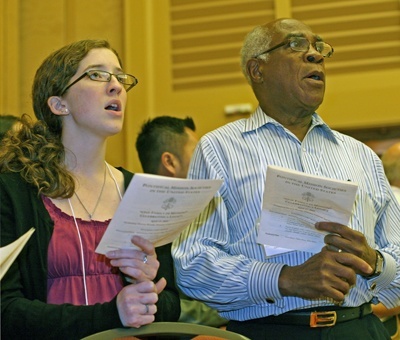
Photographer: MARLENE QUARONI | FC
Rachel Barron and Dr. Rodrigue Mortel of the Archdiocese of Baltimore sing during the Mass.
No one ordered us �Not to preach in his name� as Peter and John were by the Sahedrin when after Pentecost they set about to proclaim �repentance and forgiveness of sins�� too often we found our own excuses not to. Their zeal for souls was not the �bitter zeal� that too often today characterizes some in the Church today who spent so much energy fighting ideological battles with their fellow Catholics whom they perceived to be �either too liberal, or too conservative�. Nor was their zeal constrained by �human respect� or the erroneous idea that preaching the gospel was some type of religious imperialism or colonialism.
Their zeal was a fruit of the Holy Spirit given to them at Pentecost. That loving Spirit is still given to the Church today � without measure.
And the Spirit sends us �ad gentes� to still proclaim �repentance and forgiveness of sins� in the Lord Jesus.
The psychologist Carl Rogers in training new counselors insisted that counseling relationship would not be successful unless the counselor had �unconditional positive regard� for his clients. Now, I am not endorsing Carl Rogers. His �psychology� did mess up a whole bunch of people � especially some nuns in California in 1960�s.
But, if Peter and Paul and all the saints of the primitive Church labored and struggled and suffered martyrdom to bring the Gospel ad gentes, was because they felt that these souls were worth saving. They preached the gospel to the House of Israel and then to the Gentiles. They preached uncompromisingly � but with unconditional positive regard for the pagans they sought to save for Christ. That same �unconditional positive regard� surely motivated the 26 missionaries who died last year; and it should still motivate our missionary activity today.
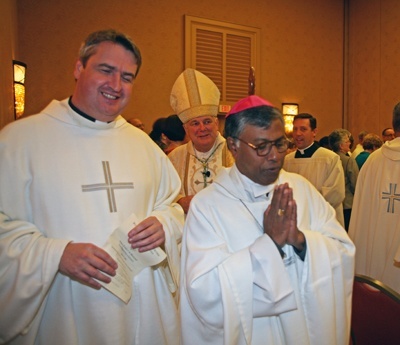
Photographer: MARLENE QUARONI | FC
Oblate Missionary Father Andrew Small, left, national director of the Pontifical Mission Societies in the U.S., and Bishop Bejoy D'Cruze, OMI, of Sylhet, Bangladesh, precede Archbishop Thomas Wenski as they process out of Mass.
�With great power the Apostles bore witness to the resurrection of the Lord Jesus, and great favor was accorded them all.� The work that you do is validated by the sacrifices of those in the mission field, especially those whose sacrifice includes martyrdom. With them �and with all those missionaries who like Peter and the apostles before us labored convinced that those souls were worth saving, we too must witness to the Son of Man who was lifted up � just as Moses had lifted up the serpent in the desert � so that �everyone who believes in him may have eternal life.�
Archbishop Thomas Wenski
Homily at Mass for Propagation of Faith Convention
Miami, April 17, 2012
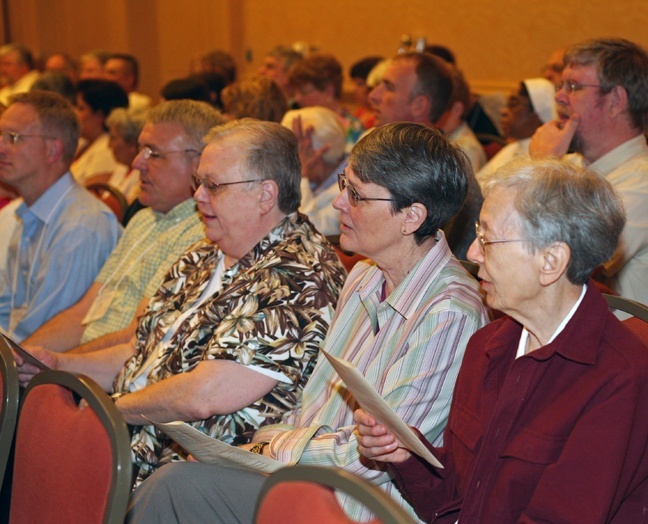
Photographer: MARLENE QUARONI | FC
Participants in the annual meeting of the Pontifical Mission Societies pray during the opening Mass, celebrated by Archbishop Thomas Wenski.

